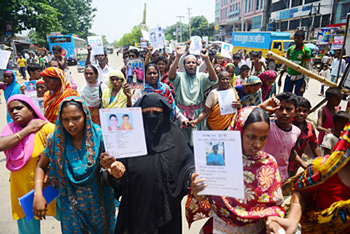

Vol. 77/No. 20 May 27, 2013

|
| Munir Uz Zaman/AFP/Getty Images |
| Garment workers in Bangladesh have taken to streets since 1,127 were killed by landlord and boss actions that led to April 24 factory building collapse. Above, protest in Dhaka May 14. |
The development of capitalism in the country and throughout Asia in recent decades has drawn hundreds of millions into the industrial working class, opening up possibilities for toilers to organize and fight on stronger foundations than ever before. The unfolding events in Bangladesh demonstrate that wherever world capitalism creates new industrial centers in pursuit of cheap labor, the class struggle follows.
A total of 1,127 workers were reported dead when rescue efforts ended May 13 at Rana Plaza in Savar, 12 miles north of the capital Dhaka. More than 3,000 workers were inside when the eight-story shoddy building — which housed five garment factories, shops and a bank — caved in 19 days earlier.
The building was evacuated April 23 because of cracks in the outer wall. The shops and the bank told their employees to stay away the following day. But garment bosses pressed workers under false assurances and threats of loss of pay. One hour after work started, the building collapsed.
Tens of thousands of workers immediately took to the streets, shutting down 60 percent of the country’s garment industry. Strikes and protests have since continued, demanding arrest of the owners, compensation to families of workers killed, four months wages and safe workplaces. Over the past week the demand for wage raises have come to the fore.
Under mounting social pressure, the government announced May 12 it would set up a board of factory owners and labor groups to propose a new minimum wage. The following day owners announced they would close down hundreds of factories indefinitely in response to “labor unrest.”
The government moves to raise the minimum wage “come because of the strikes and protests,” Nazma Akter, leader of the Bangladesh Combined Garment Workers Federation, said in a phone interview from Dhaka May 13. “And they continue. We demand a raise from 3,000 to 8,000 takas” ($37 to $102 per month).
Reaz Bin Mahmood Sumon, vice president of Bangladesh Garment Manufacturers and Exporters Association, said at a press conference May 13 that garment bosses had shut down all factories in Ashulia industrial park on the outskirts of Dhaka indefinitely due to continued labor unrest. The park is home to 500 factories employing half a million workers.
According to the Daily Star, Sumon said workers had not gone to work over the past 12 days and staged street demonstrations “without any reason” and “vandalized some factories … even after the announcement of a fresh wage board for the workers.”
The government also announced that it would amend the labor law so that workers wouldn’t need permission of factory owners to form unions.
“The issue is not really about making a new law or amending the old one,” Kalpona Akter of Bangladesh Center for Worker Solidarity told Associated Press May 13. “In the past whenever workers tried to form associations they were subjected to beatings and harassment.”
In the midst of a strike wave in 2010, the government set up a 2,900-strong industrial police force to spy on workers, subvert union organizations and protect the interests and property of the bosses.
Bangladesh’s 5,000 garment factories generate 80 percent of the country’s export income. The country is today the second biggest exporter of garments after China. Over the last two decades the garment workforce has grown from 1 million to 4 million. Most are women from rural villages, thrown into large production centers in burgeoning cities like Dhaka, with 14 million people, and Chittagong, with 5 million.
Capitalists feign concern for workers
After the mass killings on the altar of profit at Rana Plaza, the bourgeois media in the imperialist countries where much of the clothing is exported have raised that leading brands should consider moving production out of Bangladesh because of working conditions — as capitalist investors closely watch the workers’ struggles there and its effect on wages, conditions and profit margins.Wages in Bangladesh are the lowest of major garment producing countries, followed by Cambodia, another rapidly growing center of garment production. Cambodia had no garment industry until the mid-1990s. In 2010 it made up 70 to 80 percent of the country’s manufacturing exports and employed 50 percent of the manufacturing workforce. Today the industry has 500,000 workers. Some 90 percent are women from rural villages.
Cambodia stands as another example of the social transformation and class struggle resulting from capitalist development. In recent years workers have staged a number of strikes and other labor actions. In July 2010 the government raised the monthly minimum wage from $50 to $61. Two months later 200,000 workers went on strike demanding $93. In March this year it was raised to $80. On May Day thousands of garment workers demonstrated in Phnom Penh, demanding a raise to $150.
Big retailers in the U.S. and elsewhere are now eyeing a reemerging Myanmar as a new possibility, where the lifting of a U.S. ban on imports and wages around $33 per month have begun to draw capitalist investment in garment production.
Workers in Myanmar from some 70 garment factories held a series of strikes between May and July last year demanding higher wages and better conditions.
Meanwhile, more than 1,000 garment workers from Myanmar are on strike at a factory in Jordan, demanding increased pay, better food and improved working conditions. The factory produces for Ralph Lauren Canada and U.S.-based Eddie Bauer and Bon Ton.
Related articles:
Miners fight Patriot Coal drive to ‘break our union’
‘Bosses united against workers, we must unite against them’
Join May 21 and June 4 actions!
Indonesia workers rally May Day for better wages, work conditions
On the Picket Line
Texas: Worker killed, 3 injured in Exxon plant fire
Front page (for this issue) |
Home |
Text-version home